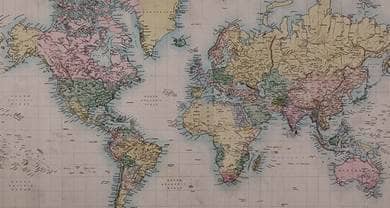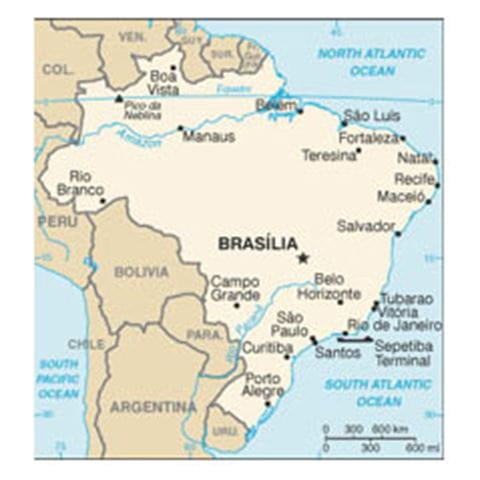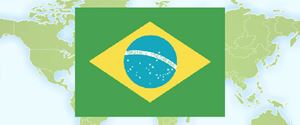- Trending:
- Pope Leo Xiv
- |
- Israel
- |
- Trump
- |
- Social Justice
- |
- Peace
- |
- Love

RELIGION LIBRARY
Brazil

The country has an area of 3,286,488 square miles and a population of 191.9 million. Nearly all major religious groups are present. Many citizens worship in more than one church or participate in the rituals of more than one religion. The 2000 census by the Geographic and Statistical Institute of Brazil indicated that approximately 74 percent of the population identified itself as Roman Catholic. Approximately 17.9 percent of the population is Protestant, an estimated 85 percent of whom are Pentecostal or evangelical, including the Assemblies of God, Christian Congregation of Brazil, Universal Church of the Kingdom of God, the Quadrangular Gospel, God is Love, Maranata, Brazil for Christ, House of the Blessing, and New Life. Lutherans, Presbyterians, Baptists, Seventh-day Adventists, Methodists, and Congregationalists account for most of the remaining Protestants and are centered in the south. In the 2000 census, 199,645 residents identified themselves as belonging to The Church of Jesus Christ of Latter-day Saints (Mormons); however, the church lists its current membership at approximately one million.
According to the 2000 census, there are 214,873 Buddhists, 2,905 Hindus, and 151,080 adherents of other eastern religions. Japanese-Brazilians, to a limited extent, practice Shintoism. The census reports 17,088 adherents of indigenous religious beliefs. Members of African and syncretic religious groups such as Candomblé total a reported 127,582, while followers of Umbanda total 397,431. There are no statistics on the number of followers of Xango or of Macumba; however, the census indicates that members of Afro-Brazilian religious groups total 0.3 percent of the population.
The census reported 25,889 practitioners of Spiritualism. However, according to Fundacão Getulio Vargas, a higher education institution considered a "policymaker think-tank," in 2003 followers of Spiritualism, mainly Kardecists--adherents of the doctrine expounded by Frenchman Allan Kardec in the 19th century--constituted approximately 1.4 percent of the population. An estimated 5 to 7 percent of the population does not practice any religion.
Reliable figures on the number of Muslims do not exist. The 2000 census reported only 27,239 Muslims. Muslim leaders estimate that there are between 700,000 and 3 million Muslims, with the lower figure representing active practitioners. There are significant Muslim communities in the industrial suburbs of the city of São Paulo and in the port city of Santos, as well as in smaller communities in Paraná State in the coastal region and in Curitiba and Foz do Iguazu in the Argentina-Brazil-Paraguay triborder area. The community is overwhelmingly Sunni; the Sunnis are almost completely assimilated into broader society. The recent Shi'ite immigrants gravitate to small insular communities in São Paulo, Curitiba, and Foz do Iguazu. Sunni and Shi'a Islam are practiced predominantly by immigrants who arrived during the past 25 years from Syria, Lebanon, and Egypt. Conversions to Islam increased during the reporting period among non-Arab citizens. There are approximately 60 mosques, Islamic religious centers, and Islamic associations.
According to the Jewish Confederation of Brazil (CONIB), there are more than 120,000 Jews, of whom 65,000 reside in São Paulo State and 40,000 in Rio de Janeiro State. Many other cities have smaller Jewish communities.
| Population | Population (2009 est.) 198,739,269 |
| Religious Demographics | Roman Catholic (nominal) 73.6%, Protestant 15.4%, Spiritualist 1.3%, Bantu/Voodoo 0.3%, other 1.8%, unspecified 0.2%, none 7.4% (2000 census) |
| Ethnic Groups | Ethnic Groups white 53.7%, mulatto (mixed white and black) 38.5%, black 6.2%, other (includes Japanese, Arab, Amerindian) 0.9%, unspecified 0.7% (2000 census) |
| Languages | Languages Portuguese (official and most widely spoken language); note - less common languages include Spanish (border areas and schools), German, Italian, Japanese, English, and a large number of minor Amerindian languages |
| Country Flag |  |










